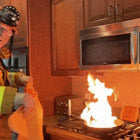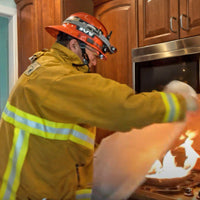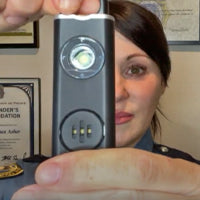Why Every Home Needs the Fire + Burn Care Kit (And How to Use It) Burns are one of the...
Space heaters are handy during cold weather, but they can set you back if you’re not careful. Knowing how space heaters impact your electric bill can help keep you warm without overspending.
In this guide, we’ll talk about how much energy they use, the types of heaters out there, and how factors like room size and insulation make a difference. You’ll also find simple tips to help you use your heater more efficiently and safely.
How Space Heaters Work

As the term suggests, space heaters help warm up a space when it’s too cold. They work by converting electricity into heat using a process called resistive heating. In addition, they have heating elements inside that resist the current when electricity flows through them. This resistance creates the heat.
There are two main ways space heaters warm a room: convection and radiation. Convection heaters warm the air around them. The warm air then rises and pushes the cooler air down. This process creates a cycle. Some models have fans, which blow warm air into the room for faster results. They’re also useful when you want to heat up an entire room evenly.
On the other hand, radiant heaters use infrared radiation to warm up objects and people directly. It’s like how the sun feels warm on your skin. These are best if you're only using part of a room or sitting in one spot for a while.
In addition, outdoor heaters usually use propane or natural gas. When ignited, the fuel burns and gives off heat. Many outdoor models use radiant heat since heating the air outside isn’t efficient, and the wind carries it away too quickly.
Most modern heaters also have safety features like tip-over shutoffs or overheating protection. Some have thermostats, so they’ll turn off when the room reaches your desired temperature.
In short, space heaters work by turning energy into heat and spreading it around, either by warming the air or heating you directly.
Factors Affecting Energy Use

Many factors affect how much energy your space heater uses. Let’s talk about them below:
Heater Efficiency
Space heaters aren’t built the same. Most convert electricity into heat, but some waste energy by producing extra light or motion. That’s where efficient models, like those with PTC (positive temperature coefficient) heating elements, come in. They use nearly all the electricity just to produce heat, so you’re not wasting power.
Thermostats are a useful feature because they switch off the heater once a room reaches a set temperature and only reactivate when needed. These conserve energy. Certain models also have advanced sensors that are more accurate than standard thermostats. They help maintain the temperature without overworking the unit.
Fan-assisted models are also worth considering. The fan spreads the heat around faster and more evenly, so the heater doesn’t run too long to warm up the room. That means less energy is used over time.
Room Size
The size of the room you’re heating matters as well. If the heater is too small for the space, it will struggle to keep up, stay on for longer, and use more electricity. On the flip side, a heater that’s too powerful may turn on and off too often, which isn’t efficient either.
Plus, heaters need to work harder to distribute heat in larger rooms. Oil-filled radiators work well in these spaces since they release heat slowly and evenly. However, they take more time to warm up. Putting one near a window helps, too. It can fight off any cold air sneaking in and make the heating feel more even.
Insulation Quality
Heat escapes quickly if your room has poor insulation, like drafty windows or thin walls. This means the heater has to work overtime to keep things warm. Better insulation keeps the heat in, so the heater doesn’t need to run as often. So, simple upgrades like sealing gaps or adding weather stripping make a huge difference.
Ceiling Height
Rooms with tall ceilings take more energy to heat. The warm air rises, so heaters have to run longer or at higher settings to keep things comfortable. For instance, a room with a 14-foot ceiling will need way more power than one with a 10-foot ceiling. You can save energy using a ceiling fan on a low setting to push warm air back down. It can help spread the heat and reduce the load on your space heater.
How Much Electricity Does a Space Heater Use?

Most space heaters use around 1,500 watts of electricity, but some models can go up to 3,000 watts. That means they use about 1.5 to 3 kilowatt-hours (kWh) for every hour they're on. If you're wondering what that means for your bill, it depends on how much your local electricity costs. For example, if power costs $0.20 per kWh, running a 1,500-watt heater used for 10 hours would add about $3 to your bill. It doesn’t sound like much, but it adds up fast if you use it daily.
To figure out the cost, multiply the kilowatts by the rate and the hours used. Plus, most space heaters run on a 120-volt outlet and draw about. They can be power-hungry, so keep that in mind when trying to manage energy use at home.
Do Space Heaters Cause a High Electric Bill?
Yes, a space heater can cause a high electric bill. If you run your space heater for about eight hours a day, it could add around $50 to your monthly bill. These heaters use a good amount of energy, especially if they’re on high or running continuously. They’re great for warming up one room quickly, but they’re not the most cost-effective option for nonstop use.
However, using them instead of central heating might save money in certain situations, like if you're heating a small space. Plus, expect your power bill to increase if you rely on them every day for many hours. The bottom line is, they’re handy for short-term warmth, but not ideal for cutting costs.
What’s the Best Time to Run a Space Heater?

The best time to run a space heater really depends on your routine, energy rates, and how you use it. If you're on a time-of-use electricity plan, it's cheaper to run your space heater during off-peak hours (usually overnight or early in the morning). But since heaters are meant to warm you up when you're cold, you’ll probably run them when the temperature drops, regardless of the time.
Space heaters are best used for quick, targeted warmth in rooms you’re using (your home office, bedroom, or living room). They work well during cooler mornings or evenings. Plus, they’re handy during mild weather when you don’t want to turn on your whole heating system. If someone in your home feels the cold more than others, a space heater in their room also helps without heating up the entire house.
Always keep safety in mind. Don’t leave space heaters running overnight or when you’re not in the room. They’re not designed to be left unattended for long periods, and it’s risky to use them near curtains, bedding, or anything flammable. Stick to using them for a few hours at a time in safe, open spaces, and always turn them off before you leave the room or go to bed.
While space heaters are useful, they can also be a fire hazard if not used properly. Most fires happen when heaters are placed too close to flammable items like curtains, bedding, or furniture. Some people also leave them running unattended or plug them into extension cords, which can overheat and spark.
To stay safe, always keep at least a three-foot space around your heater, plug it directly into the wall, and turn it off when you leave the room or go to sleep. It also helps to have fire prevention tools nearby. A fire blanket can quickly smother small flames before they spread, and a fire spray can stop a fire fast without making a huge mess. These tools can make a big difference and give you peace of mind while staying warm.
How to Save Energy When Using a Space Heater

Looking to stay warm without racking up a high electric bill? You can optimize your space heater for energy efficiency with some simple adjustments. Here are easy tips to help you stay cozy while saving energy:
1. Use Timers
Set a timer so your heater only runs when you need it. This avoids heating empty rooms and helps cut down on your power bill.
2. Maintain a Comfortable Temperature
Stick to a moderate temperature instead of cranking the heat all the way up. It takes less energy to maintain a steady, comfortable warmth than to push the heater to its limit.
3. Use the Thermostat
If your heater has a built-in thermostat, use it to automatically keep the room at your preferred temperature. Some heaters even have eco mode, which adjusts settings to save energy while staying within 1.5°F of your target temp.
4. Try Zone Heating
Only heat the rooms you're using. Then, close the doors to unused areas so the heater focuses its power where it matters most.
5. Keep the Air Moving
Use ceiling or oscillating fans to help spread the warm air around. Doing this keeps the room cozy without making the heater work harder.
Is It Cheaper to Turn Up the Heat or Use a Space Heater?

Using a space heater can save you money if you use it the right way. If you’re just trying to warm up one small room, like a bedroom or office, it’s usually cheaper to run a space heater than to turn up the heat for the entire house.
However, the energy costs add up if you’re using multiple heaters in different rooms. Space heaters work best as a backup, not your main heat source. To save money, use them for short periods and only when you're in the room. In short, a space heater can be the cheaper option, but only if you’re heating a small area for a short time. Use it wisely and always follow safety tips to avoid fire risks.
How Much Does It Cost to Run a Space Heater for One Hour?
Running a space heater for one hour usually costs between $0.10 and $0.25, depending on the heater’s wattage and your electricity rate. For example, a 1,500-watt heater (the most common size) costs about $0.24 per hour if your electricity rate is 16 cents per kilowatt-hour (the U.S. average). Smaller heaters, like 750W models, cost about $0.12 an hour.
To find your exact cost, check your heater’s wattage and multiply it by your electricity rate per kWh (just divide the watts by 1,000 first). If you’re running it for five hours a day, that’s about $36 a month for a 1,500W unit. So while space heaters are great for heating a single room, they’re only budget-friendly if you use them in short bursts or as backup heat.
Is It Cheaper to Run a Space Heater or Baseboard Heat?

Baseboard heaters are usually cheaper to run than space heaters, especially over time. They use less electricity while keeping a room warm steadily. However, baseboard heaters cost more upfront and need to be installed by professionals. On the other hand, space heaters are way cheaper and plug right in.
Space heaters also heat rooms faster, which makes them handy if you only need warmth for a short time. But it can drive your electricity bill up if you’re running one all day. In a nutshell, baseboard heaters are more cost-effective for long-term use in one space, while a space heater does the trick for short-term use without a big setup cost.
Which Type of Heater Is the Cheapest to Run?
Halogen heaters are usually the cheapest electric heaters to run. They use less power and heat up quickly, which makes them great for short-term use in small spaces. Since they give off instant heat, you don’t need to keep them running for long.
That said, what's cheapest mainly depends on how and where you use the heater. If you need something for longer use or larger rooms, oil-filled heaters might be a better pick. They take longer to heat up, but they stay warm for a while and don’t use as much energy over time. At the end of the day, it’s all about what fits your needs best.
Conclusion
Space heaters are handy for keeping warm, but they can drive up your electric bill if you’re not careful. That’s why you should know how to use them wisely. Picking the right kind, using timers, and running them at the right time can make a big difference. With a few simple adjustments, you can stay comfortable without getting hit with a high energy bill.
Do you want reliable, easy-to-use, and affordable tools to put out space heater fires before they spread? Check out Prepared Hero’s fire prevention tools here, and get up to 51% off on certain items. Stay prepared, hero!


 Fire
Fire Safety
Safety Survival
Survival Protection
Protection New
New Scouting America
Scouting America
 Fire
Fire Safety
Safety Survival
Survival Protection
Protection New
New












